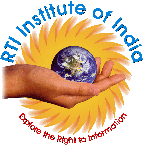The Right
to Information Act 2005 (RTI) is an Act of the
Parliament of India "to provide for setting out the
practical regime of right to information for
citizens." The Act applies to all States and Union
Territories of India.
Under the provisions of the Act, any citizen may
request information from a "public authority" (a
body of Government or "instrumentality of State")
which is required to reply expeditiously or within
thirty days.
The Act also requires every public authority to
computerize their records for wide dissemination and
to pro-actively publish certain categories of
information so that the citizens need minimum
recourse to request for information formally. This
law was passed by Parliament on 15 June 2005 and
came fully into force on 12 October 2005.Information
disclosure in India was hitherto restricted by the
Official Secrets Act 1923 and various other special
laws, which the new RTI Act now relaxes.
The Act empowers every citizen to:
• Ask any questions from the Government or seek any
information.
• Take copies of any governmental documents.
• Inspect any governmental documents.
• Inspect any Governmental works.
• Take samples of materials of any Governmental
work.
The formal recognition of a legal right to
information in India occurred more than two decades
before legislation was finally enacted, when the
Supreme Court of India ruled in State of U.P. v. Raj
Narain that the right to information is implicit in
the right to freedom of speech and expression
explicitly guaranteed in Article 19 of the Indian
Constitution.
It is applicable to all constitutional authorities,
including the executive, legislature and judiciary;
any institution or body established or constituted
by an act of Parliament or a state legislature.
It is also defined in the Act that bodies or
authorities established or constituted by order or
notification of appropriate government including
bodies "owned, controlled or substantially financed"
by government, or non-Government organizations
"substantially financed, directly or indirectly by
funds" provided by the government are also covered
in it.
The RTI Institute of India wishes to strengthen the
cause of the Right to Information by launching one
year “Diploma / PG Diploma in Right
to Information”. We are sure that this course will
help the admitted students to acquire an expert
knowledge of the methodologies of seeking required
information from the Central / State Government as
well as public sector / autonomous organisations
under the respective governments.



